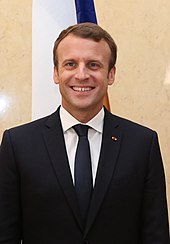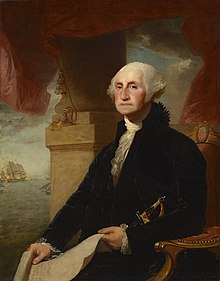President (government title)
In presidential and selected parliamentary (e.g. Botswana and South Africa) republics[1][2] the role of the president is more prominent, encompassing the functions of the head of government.As such, it originally designated the officer who presides over or "sits before" a gathering and ensures that debate is conducted according to the rules of order (see also chairman and speaker), but today it most commonly refers to an executive official in any social organization.Early examples are from the universities of Oxford and Cambridge (from 1464) and the founding president of the Royal Society William Brouncker in 1660.After the abolition of the monarchy, the English Council of State, whose members were elected by the House of Commons, became the executive government of the Commonwealth.In pre-revolutionary France, the president of a Parlement evolved into a powerful magistrate, a member of the so-called noblesse de robe ("nobility of the gown"), with considerable judicial as well as administrative authority.In the 17th and 18th centuries, seats in the Parlements, including presidencies, became effectively hereditary, since the holder of the office could ensure that it would pass to an heir by paying the crown a special tax known as the paulette.The fictional name Tourvel refers not to the parlement in which the magistrate sits, but rather, in imitation of an aristocratic title, to his private estate.British universities were headed by an official called the "Chancellor" (typically a ceremonial position) while the chief administrator held the title of "Vice-Chancellor".The question of a presidential title was being debated in Congress at the time, however, having become official legislative business with Richard Henry Lee's motion of April 23, 1789.There Adams agitated for the adoption of the style of Highness (as well as the title of Protector of Their [the United States'] Liberties) for the president.Adams and Richard Henry Lee both feared that cabals of powerful senators would unduly influence a weak executive, and saw an exalted title as a way of strengthening the presidency.[10] Adams' efforts were met with widespread derision; Thomas Jefferson called them "the most superlatively ridiculous thing I ever heard of", while Benjamin Franklin considered it "absolutely mad".[10] Washington consented to the demands of James Madison and the United States House of Representatives that the title be altered to "Mr.For example, in France, when their party controls the majority of seats in the National Assembly, the president can operate closely with the parliament and prime minister, and work towards a common agenda.When the National Assembly is controlled by their opponents, however, the president can find themselves marginalized with the opposition party prime minister exercising most of the power.However, the president is head of the civil service, commander in chief of the armed forces and in some cases can dissolve parliament.Countries using this system include Austria, Armenia, Albania, Bangladesh, Czech Republic, Germany, Greece, Hungary, Iceland, India, Ireland, Israel, Italy,[24] Malta, Pakistan, and Singapore.Such is the case in many states: Idi Amin in Uganda, Mobutu Sese Seko in Zaire, Ferdinand Marcos in the Philippines, Suharto in Indonesia, and Saddam Hussein in Iraq are some examples.Other presidents in authoritarian states have wielded only symbolic or no power such as Craveiro Lopes in Portugal and Joaquín Balaguer under the "Trujillo Era" of the Dominican Republic.Presidents like Alexandre Pétion, Rafael Carrera, Josip Broz Tito and François Duvalier died in office.However, since 1993, as a matter of convention, the presidency has been held simultaneously by the General Secretary of the Chinese Communist Party, the top leader in the single-party system.They also possess the authority (with the consent of the national assembly) to appoint the prime minister and vice president, as well as other roles.The current president, Miguel Díaz-Canel, however, has held both titles concurrently since April 2021, having been granted the rank of First Secretary by the National Assembly of People's Power following the resignation and retirement of Raúl Castro.The current president was elected by the National Assembly in December 2019 with an almost unanimous vote, and was re-elected in a similar fashion in April 2023.This likely reflects the origin of Russian republics as homelands for various ethnic groups: while all federal subjects of Russia are currently de jure equal, their predecessors, the ASSRs, used to enjoy more privileges than the ordinary krais and oblasts of the RSFSR (such as greater representation in the Soviet of Nationalities).Thus, the ASSRs and their eventual successors would have more in common with nation-states than with ordinary administrative divisions, at least in spirit, and would choose titles accordingly.[34] On 8 November 2016, the night of the 2016 presidential election in the United States, images of leaked pre-printed copies of Newsweek magazine showed the magazine celebrating the expected win of the Democratic candidate Hillary Clinton, with the cover titled "Madam President".It was unusual that it was both published and distributed before the results were known, leading to accusations of bias; the cover was pulled from newsstands after it became clear that Donald Trump had secured a majority of electoral votes, winning the election.
(Left to right: George H. W. Bush , Barack Obama , George W. Bush , Bill Clinton , and Jimmy Carter )







Executive governmentHead of stateMonarchSupreme leaderPresident of the council of stateDictatorGovernor-generalGovernmentHead of governmentChancellorChief executiveChief ministerFirst ministerMinister-presidentPremierPrime ministerPresident of the Council of MinistersPresident of the governmentCabinetGovernment formationCabinet collective responsibilityMinistrySecretaryMinisterCommissaryCommissionerGovernorPresidencySystemsMonarchyConstitutionalRepublicParliamentaryDirectorialWestminsterSemi-parliamentarysimul simulSemi-presidentialcohabitationalPresidentialNational governmentsHeads of state and governmentrepublicsWhite HouseGeorge H. W. BushBarack ObamaGeorge W. BushBill ClintonJimmy CarterPrabowo SubiantoRepublic of Indonesiademocraticallypopular voteparliamentary republicsBotswanaSouth Africasemi-presidential republicsone-party stateEnglishpresident of the French Republicspeaker of the House of Commons of CanadaKing James BibleDanielAramaicrules of orderchairmanspeakerOxfordCambridgepresident of the Royal SocietyWilliam BrounckerPresident of the Board of TradeLord President of the CouncilUnited KingdomUnited Statesvice presidentAnglicanCommonwealth of EnglandThomas Hungerfordspeaker of the English House of CommonsCouncil of StateexecutivePrivy Councillord presidentJohn BradshawFranceParlementmagistratenoblesse de robenobilitypauletteFrench RevolutionFrenchPierre Choderlos de LaclosLes Liaisons dangereusesSecond French RepublicPresident of the United StatesUnited States Constitutionpresident of the Continental CongressMassachusetts Provincial CongressVice-ChancellorHarvard UniversityYale UniversityCambridge UniversityMagdalene College, CambridgeHenry DunsterYale Collegerectorpresident of the RepublicUnited States Senatepresident of the SenateGeorge Washingtonfirst president of the United StatesConstitution of the United StatesRichard Henry LeeJohn Adamscongressional committeepresident of PennsylvaniaThomas JeffersonBenjamin FranklinJames MadisonUnited States House of RepresentativesincumbentCaribbeanHenri ChristopheItalian Republic of 1802
